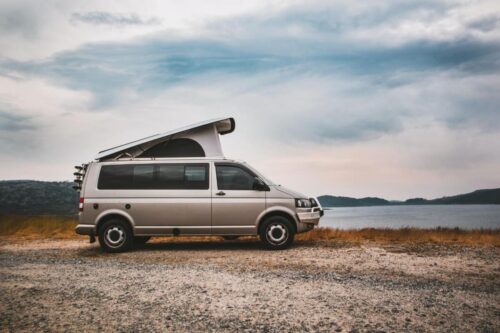From the hazy mountain peak to the salty seashore, and every national park in between, we RVers love being outside! It is only natural that we want to preserve the dignity of the earth’s fragile ecosystems, allowing her to shine for generations to come.
Choosing eco-friendly solutions for RVing can be overwhelming, but remember that every little thing helps. RVs, campers, and vans use much less energy and resources than our apartments or houses do, making them already more eco-friendly. So pat yourself on the back; you’ve earned it!
Here are 14 other small (but effective) steps to sustainable living in an RV.
14 ECO-FRIENDLY TIPS FOR LIVING IN AN RV

1. Choose The Right Size RV
The first place to start when wanting to create a more eco-friendly RV experience is to choose a camper size that is appropriate for you. A couple or small family does not necessarily need a huge fifth-wheel trailer, while it may seem luxurious. Decide what amenities matter most to you and go with the most compact option to meet your needs.
People often purchase the largest RV they can for the storage space, only to find out if they fill up all the space, they’ll exceed their GVWR!
So don’t be tempted by the bigger-is-better fallacy. Smaller RVs are often safer in bad weather, are easier to tow or drive, require smaller tow vehicles, and can be taken to the boondocks. If you’re considering something with a wet bath, check out this comparison guide.
If you’re looking for something really small (under 5,000 lbs), check out this guide!
2. Service Your RV or Towing Vehicle Regularly

A well-oiled machine runs smoothly. This is true for your RV or towing vehicle as well. Be sure to keep up with oil changes, engine repairs, and tire health to help ensure low-impact travel. Here’s a guide to motorhome maintenance tips you may find helpful.
This will help prevent oil leaks, increase fuel efficiency, and also detect smaller problems before they turn into large expensive ones. Translation: Less oil spilled, less gasoline burned.
By making sure that your vehicle is running optimally, you can help create a more eco-friendly RV for the road.
3. Go Solar
Today, many RV lifestyle enthusiasts are embracing the sun. Solar panels make a great addition to your RV, van, or trailer and thanks to modern technology, these panels are lightweight and easy to install. Here’s a simple guide to installing RV solar for beginners.
Wondering what size of solar panel system to get?
- 100 watts: Weekend warriors
- 200 watts: Adventurers, family campers
- 300-400 watts: Serious boondockers*
- 400+ watts: Full-timers
With solar panels and an extended battery bank, you can enjoy the convenience and peace of mind of backup power without the guilt of diesel-powered generators.
4. Turn Off The Air Conditioner

Nothing soothes the soul as much as a fresh breath of mountain air. So open those windows and switch off the air conditioner!
- In the summer, try to set your RV or camper up in a nice shady spot to keep it cool.
- Keep your RV roof clean and bright white to reflect sunlight. Dirty roofs absorb more heat.
- You can also try handheld or camping fans that are battery-operated to help keep the pressure off the power grid.
- Use the roof vent for ventilation. That’s what it’s for! Crack open a window on either side of the RV for best airflow.
In the colder months, don’t reach for that heat dial! Save your propane and add a few layers of clothing and snuggle up under warm blankets.
5. Implement a Wash Bucket
It can be easy to forget how much water you use when you do dishes, especially if you do not have to worry about your gray tank filling up when you score a spot with a full hookup. Implementing a wash bucket for dishes allows for control of how much water you use for the initial rinsing. The best part is, you can enjoy some fresh air while you scrub the dishes outside!
6. Use Eco-Friendly Cleaners
The chemicals inside the cleaners we use end up in our waterways, causing damage and disruption to aquatic ecosystems. We can help reduce the quantity of chemicals entering the waterways by choosing cleaning products that have less (or no) chemicals. Today, you can find eco-friendly and green cleaners at almost every big box store or you can make your own. Here is a simple recipe for an all-purpose natural cleaner that really works!
- Soak orange peels in vinegar for 2 weeks
- Strain the vinegar into a spray bottle, add two drops of liquid dish soap, and fill the rest of the way with clean water.
Now you have a cheap, effective, and natural cleaning solution for your RV!
7. Use Reusable Washcloths
The allure of using paper towels over washcloths is a strong one, especially when we do not have a washing machine readily available to use. However, using paper towels or other single-use products creates a large amount of waste. If you use a washcloth, simply rinse with water and hang dry outside to use again.
Thanks to the immense social shift toward sustainability, you can now get reusable, anti-microbial, and adorable reusable paper towels! These products can be used a handful of times before needing to be discarded which reduces the amount of waste we create.
8. Choose RV-Safe Toilet Paper

Toilet paper designed for RV use is the safest product for your RV or trailer septic system. It will dissolve inside your black tank, preventing clogs and other disruptions. This also means that less paper waste will go into the campground septic tanks. Problems within a septic system can be costly and not to mention a little smelly. So avoid potential problems, and help save the earth with a simple switch to RV toilet paper (or another single-ply septic-safe toilet paper).
9. Reusable Dishware
No one likes to do dishes, especially on vacation, but using reusable dishware is a simple switch that can keep millions of paper plates, plastic cutlery, and styrofoam cups out of landfills.
Choose a lightweight plastic design for durability and to help keep the weight down inside your RV. Don’t use porcelain or other ceramic. It’s heavy and easily cracks. After dinner, go ahead and wash them in your wash bucket for twice the amount of planet-saving fun!
10. Avoid Single-Use Plastics
Zero-waste lifestyle is a fancy way of saying that you do not produce a large amount of individual trash. This can be done with easy swaps like:
- Bring your own reusable bags to the grocery store when you go to stock up the RV.
- Choose products that are not plastic wrapped.
- Avoid using plastic bags from the produce section.
- Install a water filter on your RV’s sink. That allows you to safely drink campground drinking water and reduces the amount of bottled water you buy (It is always a good idea to keep at least one emergency gallon on hand, though).
11. Cook Inside

Who doesn’t love delicious, wood-smoked, char-grilled goodness! I love roasting some veggies or grilling burgers over an open flame.
However, wood-fueled campfires spew out far more atmospheric toxins and greenhouse gases than a propane cooktop. I’m not saying to ban all campfires, but enjoy them judiciously! For basic cooking, place a cast iron pot or pan on the cooktop and enjoy stews, casseroles, and more!
12. Live Small
The RV lifestyle has a calmness and slowness about it that attracts many. Intentional living in smaller spaces can be difficult to adjust to at first, but you will soon learn what you absolutely need and what you can live without. While campers today have a lot of space for storage carved out, you can make your RV life much more efficient by limiting the things you bring along. Carrying too many items also makes for a heavy camper, leading to poor gas mileage and fuel use.
Here’s a shortlist of RV accessories you really don’t need:
- Canned goods
- Hardcover books
- Milk crates
- 16 pairs of shoes
- Cast iron cookware
- Gourmet kitchen appliances
13. Use an Inverter Generator
Conventional generators consume the same amount of fuel almost regardless of load. But inverter generators can vary the fuel consumed based on electrical load! An inverter generator like a Champion, Yamaha, or Honda can run on a single gallon of gasoline for up to 8+ hours!
14. Insulate Your RV
RVs aren’t known for their insulation – and that’s being nice. If you camp in cold weather when you run your propane furnace, you can save a LOT of propane by insulating your windows and roof fans, draft-proof your entry doors, installing heavy curtains, and even installing block foam underneath your subfloor.
***
When we live the RV lifestyle, we begin to really see the impact our daily choices have on the environment and the world around us. We can help reduce the stress on the world by making small, simple, and easy eco-friendly choices and implanting them.
We begin by choosing the right size RV, maintaining it properly, and adding solar panels for environmentally friendly backup energy. We can reduce waste and trash by using reusable products, dishware, and washcloths as we try to aim for a zero-waste lifestyle.
Sara Sabharwal is a modern digital nomad exploring the world one road trip at a time. She splits her time between North America and India and has yet to find a place that she didn’t fall in love with. Her favorite destinations include dark sky parks and forested mountain ranges. My dream is to live in a van down by the river, which I luckily get to do 3-6 months out of the year.
-
Sara Sabharwalhttps://changingears.com/author/sara-sabharwal/
-
Sara Sabharwalhttps://changingears.com/author/sara-sabharwal/
-
Sara Sabharwalhttps://changingears.com/author/sara-sabharwal/
-
Sara Sabharwalhttps://changingears.com/author/sara-sabharwal/










